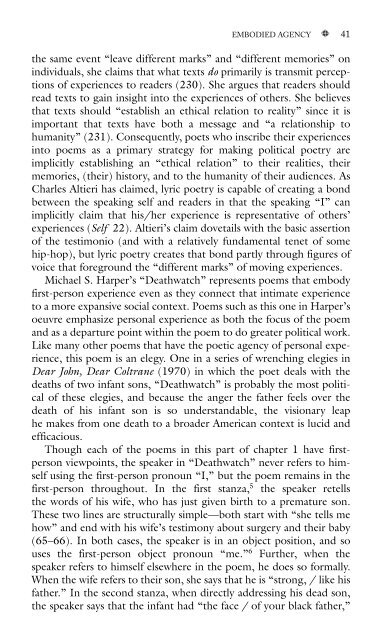american political poetry in the 21st century - STIBA Malang
american political poetry in the 21st century - STIBA Malang
american political poetry in the 21st century - STIBA Malang
You also want an ePaper? Increase the reach of your titles
YUMPU automatically turns print PDFs into web optimized ePapers that Google loves.
EMBODIED AGENCY 41<br />
<strong>the</strong> same event “leave different marks” and “different memories” on<br />
<strong>in</strong>dividuals, she claims that what texts do primarily is transmit perceptions<br />
of experiences to readers (230). She argues that readers should<br />
read texts to ga<strong>in</strong> <strong>in</strong>sight <strong>in</strong>to <strong>the</strong> experiences of o<strong>the</strong>rs. She believes<br />
that texts should “establish an ethical relation to reality” s<strong>in</strong>ce it is<br />
important that texts have both a message and “a relationship to<br />
humanity” (231). Consequently, poets who <strong>in</strong>scribe <strong>the</strong>ir experiences<br />
<strong>in</strong>to poems as a primary strategy for mak<strong>in</strong>g <strong>political</strong> <strong>poetry</strong> are<br />
implicitly establish<strong>in</strong>g an “ethical relation” to <strong>the</strong>ir realities, <strong>the</strong>ir<br />
memories, (<strong>the</strong>ir) history, and to <strong>the</strong> humanity of <strong>the</strong>ir audiences. As<br />
Charles Altieri has claimed, lyric <strong>poetry</strong> is capable of creat<strong>in</strong>g a bond<br />
between <strong>the</strong> speak<strong>in</strong>g self and readers <strong>in</strong> that <strong>the</strong> speak<strong>in</strong>g “I” can<br />
implicitly claim that his/her experience is representative of o<strong>the</strong>rs’<br />
experiences (Self 22). Altieri’s claim dovetails with <strong>the</strong> basic assertion<br />
of <strong>the</strong> testimonio (and with a relatively fundamental tenet of some<br />
hip-hop), but lyric <strong>poetry</strong> creates that bond partly through figures of<br />
voice that foreground <strong>the</strong> “different marks” of mov<strong>in</strong>g experiences.<br />
Michael S. Harper’s “Deathwatch” represents poems that embody<br />
first-person experience even as <strong>the</strong>y connect that <strong>in</strong>timate experience<br />
to a more expansive social context. Poems such as this one <strong>in</strong> Harper’s<br />
oeuvre emphasize personal experience as both <strong>the</strong> focus of <strong>the</strong> poem<br />
and as a departure po<strong>in</strong>t with<strong>in</strong> <strong>the</strong> poem to do greater <strong>political</strong> work.<br />
Like many o<strong>the</strong>r poems that have <strong>the</strong> poetic agency of personal experience,<br />
this poem is an elegy. One <strong>in</strong> a series of wrench<strong>in</strong>g elegies <strong>in</strong><br />
Dear John, Dear Coltrane (1970) <strong>in</strong> which <strong>the</strong> poet deals with <strong>the</strong><br />
deaths of two <strong>in</strong>fant sons, “Deathwatch” is probably <strong>the</strong> most <strong>political</strong><br />
of <strong>the</strong>se elegies, and because <strong>the</strong> anger <strong>the</strong> fa<strong>the</strong>r feels over <strong>the</strong><br />
death of his <strong>in</strong>fant son is so understandable, <strong>the</strong> visionary leap<br />
he makes from one death to a broader American context is lucid and<br />
efficacious.<br />
Though each of <strong>the</strong> poems <strong>in</strong> this part of chapter 1 have firstperson<br />
viewpo<strong>in</strong>ts, <strong>the</strong> speaker <strong>in</strong> “Deathwatch” never refers to himself<br />
us<strong>in</strong>g <strong>the</strong> first-person pronoun “I,” but <strong>the</strong> poem rema<strong>in</strong>s <strong>in</strong> <strong>the</strong><br />
first-person throughout. In <strong>the</strong> first stanza, 5 <strong>the</strong> speaker retells<br />
<strong>the</strong> words of his wife, who has just given birth to a premature son.<br />
These two l<strong>in</strong>es are structurally simple—both start with “she tells me<br />
how” and end with his wife’s testimony about surgery and <strong>the</strong>ir baby<br />
(65–66). In both cases, <strong>the</strong> speaker is <strong>in</strong> an object position, and so<br />
uses <strong>the</strong> first-person object pronoun “me.” 6 Fur<strong>the</strong>r, when <strong>the</strong><br />
speaker refers to himself elsewhere <strong>in</strong> <strong>the</strong> poem, he does so formally.<br />
When <strong>the</strong> wife refers to <strong>the</strong>ir son, she says that he is “strong, / like his<br />
fa<strong>the</strong>r.” In <strong>the</strong> second stanza, when directly address<strong>in</strong>g his dead son,<br />
<strong>the</strong> speaker says that <strong>the</strong> <strong>in</strong>fant had “<strong>the</strong> face / of your black fa<strong>the</strong>r,”










